
Researching Canadian Soldiers of the First World War
Part 6: Researching Honours and Awards
By Michael O'Leary; The Regimental Rogue
Honours and Awards
Many soldiers and officers of the Canadian Expeditionary Force received honours and awards for valour, meritorious service, or other commendable performance on and off the field of battle. Some of the more common awards include, but the full list of awards is certainly not limited to, the following:
- Mention in Despatches (MiD).
- Military Medal (MM).
- Distinguished Conduct Medal (DCM).
- Military Cross (MC).
- Distinguished Service Order (DSO).
- Victoria Cross (VC).
The website of Veterans Affairs Canada provides an excellent resource to learn about these honours and awards, as well as the medals awarded for service in each of Canada's wars—Orders, Decorations and Medals.
While the other honours listed above are represented by medals worn by the soldier, the Mention in Despatches is somewhat different. Coming from a tradition where a commander in the field might specifically bring the names of certain men under his command to the King's (or Queen's) attention for their conduct and performance, this itself came to be recognized as an award in its own right. After the First World War (i.e., authorized in 1920), those who were Mentioned in Despatches were entitled to wear a small bronze oak leaf emblem on their Victory Medal (or on British War Medal if the Victory Medal was not received).
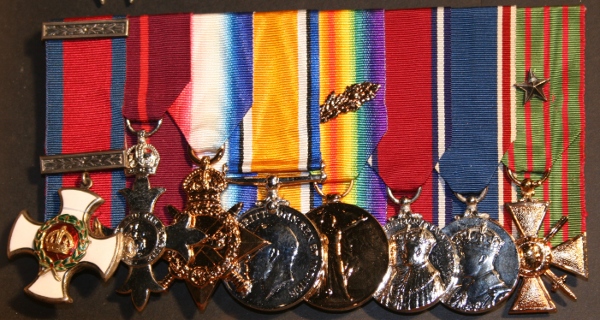
First World War (and later) medal group of Maj.-Gen. William Waring Primrose Gibsone, C.M.G., D.S.O., O.B.E, Croix de Guerre (France), The Royal Canadian Regiment.
Shown (from left) are his Distinguished Service Order (DSO), Officer of the Order of the British Empire (OBE), 1914-15 Star, British War Medal (BWM), "Victory Medal (VM) with Mention in Despatches Emblem (MiD), and Jubilee Medal 1935 Coronation Medal 1937, and the Croix de Guerre (France). Not shown is the neck badge for his Companion of the Most Distinguished Order of St. Michael and St. George (CMG).
This section of the Canadian Expeditionary Force Study Group is also a valuable source of information on honours and awards granted to soldiers of the CEF.
Library and Archives Canada: Medals, Honours and Awards
In late 2010, the Library and Archives Canada made available an online database of Medals, Honours and Awards to Canadians. Searches of these records will confirm awards, and will also provide file references to available records.
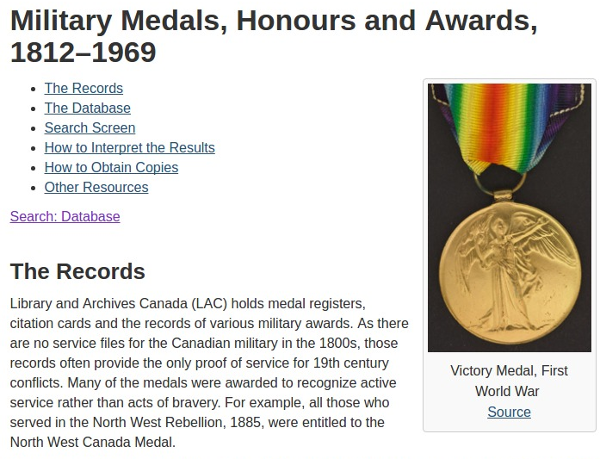
The introduction page for the form for the Library and Archives Canada database of Medals, Honours and Awards.
In some cases the available records will do little more than confirm that the award was received, in others more information will be available. At this time, searches by "regiment" (i.e, unit) will not provide results as this is not completed for First World War entries.
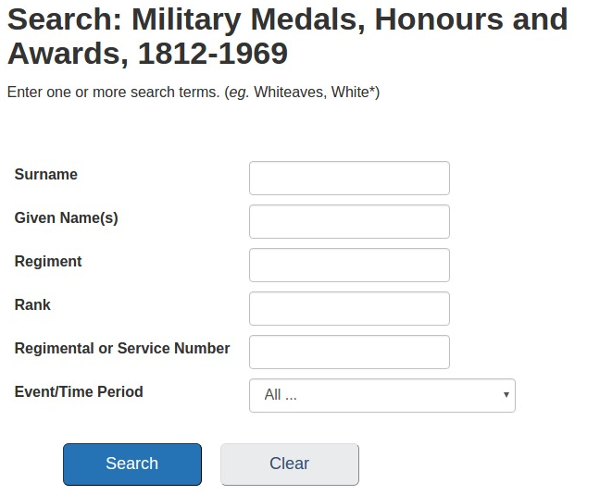
The search form for the form for the Library and Archives Canada database of Medals, Honours and Awards.
The London Gazette
While the Veterans Affairs Canada website and other online sources can provide detailed information about each order, decoration and medal, they will not provide details on the award of any of these to individual soldiers. In some cases, entries in service records or war diaries and unit histories will confirm an award.
These sources may also provide the next clue in the form of a date of award and/or the date and issue number for the awards publicaton in the London Gazette (LG). The publication in the London Gazette, known as being "Gazetted", was the formal announcement of an honour or award. Conversely, this published announcement then forms the official proof that the award has been granted.
Once you start a basic search using the text box on the main page for the Gazette, the sidebar search control box will let you refine the search by editing your text, selecting date limits or adjusting other parameters. Searching the Gazette can be frustrating because the search for content is based on computer recognized text, and not every page of every edition was scanned and read clearly. Sometimes a variety of methods must be used by a diligent searcher: surname, surname with given names and/or initials (in the exact phrase option), service number, or any combination of the above. It is best if you know there is an entry and are working to narrow the range of possible dates from service record entries, etc. Searching the Gazette "just in case" your soldier appears can have a low probablility of success. The Gazette does alo provide a help section.
As can be expected, common names can bring large numbers of returned results, even when the selected historic event limits the search to the issues for the First World War. Occasionally, there is little option but to wade through many possible pages, downloading each image to visually confirm the inclusion (or not) of your soldier's name. If you know he should be there, patience will eventually be rewarded.
Once you have exhausted your patience with the Gazette search engine without success, as a last resort help can always be sought on the Canadian Expeditionary Force Study Group or the Great War Forum. each forum has a few true artists at coaxing information from the London Gazette.
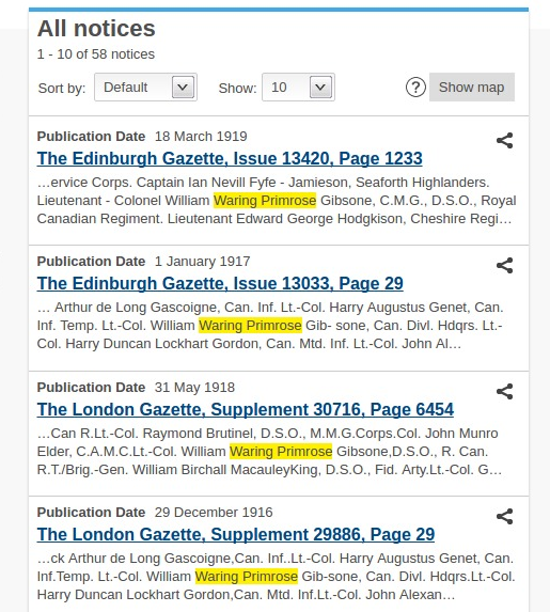
London Gazette search results for the uncommon middle names of Major-General (at the time a Lieutenant Colonel) William Waring Primrose Gibsone . Many entries (though not all) for officers will include full given names, those for soldiers and non-commissioned officers will normally only include initials.
Even when the right page is found in the London Gazette, the work may not be completed. When large numbers of officers or soldiers received an award, the lists can span multiple (or many) pages and it will require working back through the edition one page at a time to confirm the appropriate headings for the secition in which you have found the name.
Entries for honours and awards in the London Gazette can take two basic forms. The first and simplest, commonly reffered to as simply a "Gazette", is the listing of the name against the award to be conferred. This was the initial official announcement of the award.
The second entry, or occasionally the only appearance, is the publication of the citation of an award. This is the description of actions taken which resulted in the recommendation for, and award of, the particular honour.
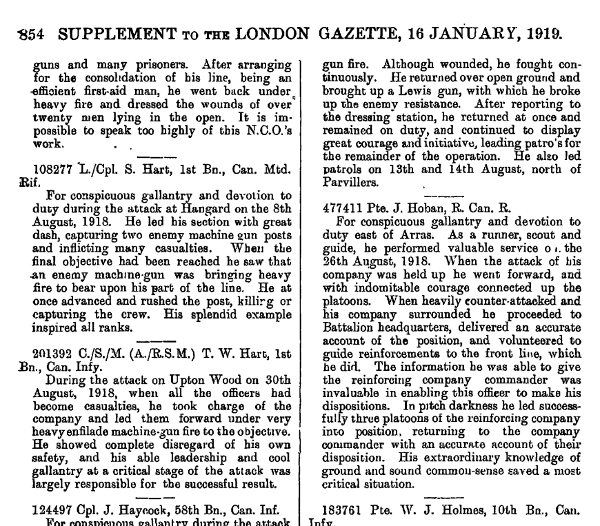
London Gazette citations for the award of the Distinguished Conduct Medal.
Citations may be found for the Military Cross, Distinguished Conduct Medal and certain other awards. They will not be found for Orders of Knighthood, or for decorations awarded in the King's Birthday or New Year's honours lists, many of which were awards for overall commendable performance and not necessarily for singular actions in battle. Citations will also not be found in the London Gazette for recipients of the Military Medal.
Requests to find the citations for awards of the Military Medal to soldiers of the Canadian Expeditionary Force are a common request to researchers and others with experience in researching soldiers. Unfortunately, it is also one of the most commonly disappointed requests. Citations exist for some of the earliest Military Medal awards, in 1916, but these were not published in the London Gazette. They are also rarely found in war diaries, regimental histories or service records. The citations that do exist are found in dedicated files in the Library and Archives Canada and the best approach is to resort to an experienced Ottawa researcher to dig them out. If you believe the award of a Military Medal to an ancestor is early enough to have a citation, seek a recommendation for a reaearcher at the Canadian Expeditionary Force Study Group.
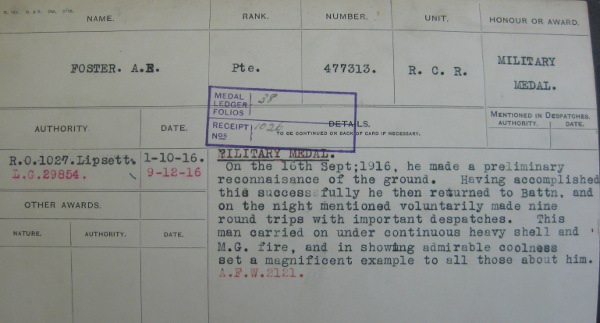
The 1916 Military medal citation for 477313 Cpl Albert Edward Foster, The Royal Canadian Regiment.
When a citation cannot be found, then other evidence must be sought. Starting with the date of the Gazette listing, consider that the time from action to publications could be 2-4 months (or more). From that a diligent search of war diary, unit history, service record and any other information which has been found in expanding research can be made in the hope (albeit slim) that some mention will be found of your soldier's recognized performance on the field of battle. Look also for dates of wounding that may be associated with combat actions, and dig deeper into unit activities on those dates. In any event, take heart that none of these awards were granted lightly, each and every one was well earned by the recipient.
Researching Canadian Soldiers of the First World War
- Introduction
- Part 1: Find your Man (or Woman)
- Part 2: The Service Record
- Part 3: Court Martial Records
- Part 4: War Diaries and Unit Histories
- Part 5: Casualties
- Part 6: Researching Honours and Awards
- Part 7: Deciphering Battlefield Location Information
- Part 8: More Mapping Information
- Part 9: Matching Battlefield Locations to the Modern Map
- Part 10: Service Numbers; More than meets the eye
- Part 11: Rank, no simple progression
- Part 12: Medals; Pip, Squeak, Wilfred and the whole gang
- Part 13: Evacuation to Hospital
- Part 14: The Wounded and Sick
- Part 15: Crime …
- Part 16: … and Punishment
- Part 17: Battalions and Brigades, Companies and Corps
- Part 18: Photo Forensics: Badges and Patches
- Part 19: Veterans Death Cards
- Part 20: The Vimy Pilgrims (1936)

- The O'Leary Collection; Medals of The Royal Canadian Regiment.
- Researching Canadian Soldiers of the First World War
- Researching The Royal Canadian Regiment
- The RCR in the First World War
- Badges of The RCR
- The Senior Subaltern
- The Minute Book (blog)
- Rogue Papers
- Tactical Primers
- The Regimental Library
- Battle Honours
- Perpetuation of the CEF
- A Miscellany
- Quotes
- The Frontenac Times
- Site Map
QUICK LINKS
- Tomb of the Unknown Soldier
- Vimy Memorial
- Dieppe Cemetery
- Perpetuation of CEF Units
- Researching Military Records
- Recommended Reading
- The Frontenac Times
- RCR Cap Badge (unique)
- Boer War Battles
- In Praise of Infantry
- Naval Toast of the Day
- Toasts in the Army (1956)
- Duties of the CSM and CQMS (1942)
- The "Man-in-the-Dark" Theory of Infantry Tactics and the "Expanding Torrent" System of Attack
- The Soldier's Pillar of Fire by Night; The Need for a Framework of Tactics (1921)
- Section Leading; A Guide for the Training of Non-Commissioned Officers as Commanders and Rifle Sections, 1928 (PDF)
- The Training of the Infantry Soldier (1929)
- Modern Infantry Discipline (1934)
- A Defence of Close-Order Drill (1934): A Reply To "Modern Infantry Discipline"
- Tactical Training in the British Army (1901)
- The Promotion and Examination of Army Officers (1903)
- Discipline and Personality (1925)
- The Necessity of Cultivating Brigade Spirit in Peace Time (1927)
- The Human Element In War (1927)
- The Human Element In Tanks (1927)
- Morale And Leadership (1929)
- The Sergeant-Major (1929)
- The Essence Of War (1930)
- Looks or Use? (1931)
- The Colours (1932)
- Personality in Leadership (1934)
- Origins of Some Military Terms (1935)
- Practical Examination; Promotion to Colonel N.P.A.M. (1936)
- Company Training (1937)
- Lament Of A Colonel's Lady (1938)
- Morale (1950)
- War Diaries—Good, Bad and Indifferent
- Catchwords – The Curse and the Cure (1953)
- Duelling in the Army
- Exercise DASH, A Jump Story (1954)
- The Man Who Wore Three Hats—DOUBLE ROLE
- Some Notes on Military Swords
- The Old Defence Quarterly (1960)
- Military History For All (1962)
- Notes for Visiting Generals (1963)
- Hints to General Staff Officers (1964)
- Notes for Young TEWTISTS (1966)
- THE P.B.I. (1970)
- Standing Orders for Army Brides (1973)
- The Time Safety Factor (1978)
- Raids (1933)
- Ludendorff on Clerking (1917)
- Pigeons in the Great War
- Canadian Officer Training Syllabus (1917)
- The Tragedy of the Last Bay (1927)
- The Trench Magazine (1928)
- Billets and Batman (1933)
- Some Notes on Shell Shock (1935)
- Wasted Time in Regimental Soldiering (1936)
- THE REGIMENT (1946)
- The Case for the Regimental System (1951)
- Regimental Tradition in the Infantry (1951)
- The Winter Clothing of British Troops in Canada, 1848-1849
- Notes On The Canadian Militia (1886)
- Re-Armament in the Dominions - Canada (1939)
- The Complete Kit of the Infantry Officer (1901)
- The Canadian Militia System (1901)
- The Infantry Militia Officer of To-day and His Problems (1926)
- Personality in Leadership (1934)
- British Regular Army in Canada
- Battle Honours (1957)
- Defence: The Great Canadian Fairy Tale (1972)
- The Pig (1986)